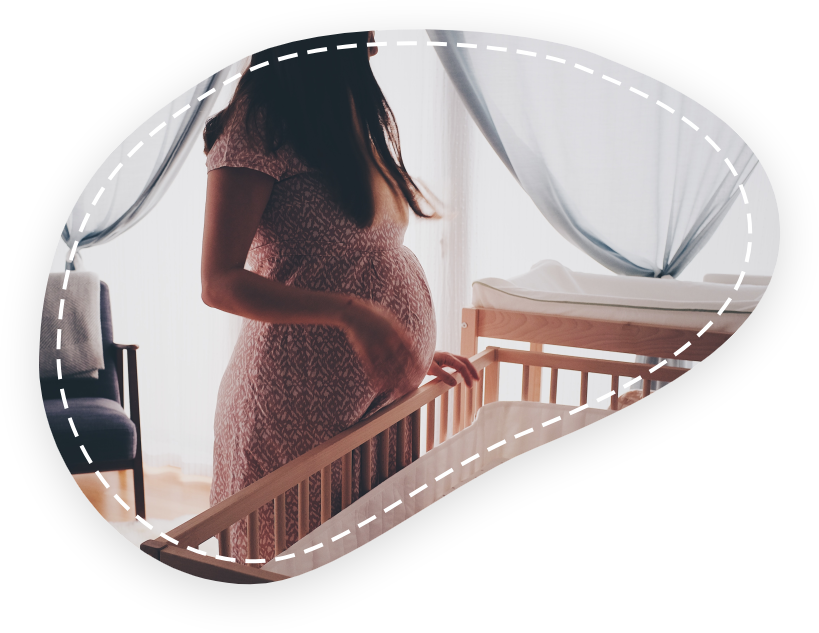Pregnancy timeline
What’s about to happen during pregnancy? When do important ultrasounds take place? Which courses and information evenings are interesting to participate in? We have made a list of the most important events for you.

Pregnancy timeline
Week 5: Pregnancy test
Only from the fifth week of pregnancy a test can show a fully reliable result.
Week 7 – 9: Vitality ultrasound
In most cases your first ultrasound will be done vaginally because the embryo is most likely too small to see it externally. During this ultrasound they usually check:
- The beating of the heart
- Single or multiple pregnancy
- If the pregnancy is located in or outside the uterus
- If the embryo has settled in the right place in the womb
- If there are any visible abnormalities in and around the uterus
Week 8-10: First appointment with your midwife
During this first appointment with a midwife your pregnancy term is estimated and an expected due date is defined.
Week 10-16: Arranging Maternity Care
The right moment to start making arrangements for maternity care is at approximately 10 weeks of pregnancy, preferably after your pregnancy term ultrasound so that you know your correct due date.
Week 10-12: Pregnancy term ultrasound
This pregnancy term ultrasound is meant to determine your pregnancy term by measuring the embryo.
Week 11: the NIPT (non-invasive prenatal test)
The NIPT is a blood test. A sample of blood is drawn from the mother to identify the risk of a baby born with Down Syndrome, Edward Syndrome or Patau Syndrome. This test is optional; you may choose whether you want to have it carried out or not.
Week 12: Pregnancy announcement
Many future parents prefer to announce their pregnancy to family and friends around week 12, after they have confirmation by ultrasound that the pregnancy is developing normally.
Week 12-17: 13th week ultrasound
This ultrasound is a medical review of the baby. They check for possible physical abnormalities of the baby and the placenta and the amount of amniotic fluid. This ultrasound can detect serious birth defects at an early stage.
Week 12-14: Centering Pregnancy
“Centering pregnancy” is a relatively new way of prenatal care. Centering pregnancy allows you to meet other pregnant women with more or less the same due date. During these meetings you address various themes around pregnancy, your upcoming delivery and your maternity period. There is a lot of room for open conversation, creating a supportive and supplementing group dynamic.
Week 13: Reporting your maternity leave.
Legally you are obliged to inform your employer about your pregnancy three weeks before your maternity leave. However, three weeks is a rather short notice for most employers, apart from the fact that your colleagues will probably have noticed your pregnancy earlier. Usually the big news is shared with employers and colleagues around week 13.
Besides your pregnancy announcement it is advised to discuss a few practical issues with your employer:
- When you wish to go on maternity leave
- How many days you wish to work when you return after your leave.
- If there is an opportunity to breastpump at work.
Week 14: start of the second trimester
Your first trimester has ended. Your pregnancy ailments start to diminish and your belly starts to grow. A perfect time to start arranging Maternity Care. At this stage your maternity care company has enough time to start making arrangements for you.
Week 16: Sex determination
As of week 16 the baby’s sex can be determined with almost certainty. Some people choose to plan a special ultrasound for the occasion, others wait until the 20 weeks ultrasound.
Week 17: Maternity Package
It is advised to have a maternity package at home from week 17. This package contains various items you might need in case of an unexpected home birth.
Week 19: Requesting parental leave
Legally you are entitled to parental leave (ouderschapsverlof). It is basically a request for extra free days at work. Usually these days are unpaid, unless agreed upon otherwise with your employer. Parental leave must be requested at least two months in advance.
Week 19: Structural ultrasound scan
This scan is also named the 20-weeks ultrasound. Through an abdominal ultrasound the baby’s health can be visibly checked; is it growing properly? Is there enough amniotic fluid? How is the state of the placenta? They also check again for physical abnormalities.
Week 22: Pertussis (whooping cough) vaccination (22-weeks vaccination)
If you get vaccinated, your baby also benefits from this! The pertussis vaccination protects you and your baby against developing whooping cough.
Week 22: acknowledgement of paternity
Are you and your partner unmarried? In this case your partner would have to acknowledge the baby at the municipal population affairs office. This is called a family law relationship.
Week 25: Antenatal classes
With a fixed group of pregnant women you address various issues around pregnancy, labour and birth. There is a long version: the 8 day course, and a short version: the 4 day course.
Week 25: Educational evening about breastfeeding
This course will be lectured by a lactation consultant and will provide you with information about breastfeeding. This evening is also suitable for parents that haven’t made up their minds yet about the choice to breastfeed or not.
Week 28-36: Educational evening about parenthood
Learn about parenting in an approachable way. The course is divided in two themes: “contact with your baby” and “parenting”. This evening will be lectured by a pediatric psychologist and a nurse from the consultatiebureau (Child Consultation Office).
Week 26 – 30: Intake maternity care
It is time for your intake with one of our consultants. The perfect time to clarify your expectations about maternity care.
Week 32: Birth plan
In your birth plan you define your expectations and wishes concerning labor and delivery. For example who will be joining you and where you wish to deliver your baby. You discuss this plan in advance with your partner, midwife and possibly with other people your wish to have present when you give birth. Although a birth can never be planned exactly, a birth plan may be a guideline for caregivers in case of unexpected circumstances.
Week 36: Maternity Leave
Legally you are not allowed to work past 36 weeks of pregnancy. Some choose to start their maternity leave 6 weeks before birth, others 4 weeks in advance. We particularly advise you to listen to your body. In some cases it is necessary, due to pregnancy symptoms, to reduce or stop working sooner. In this case your leave starts at 6 weeks before birth.
Week 37: Full Term Baby
You are due at 40 weeks, but three weeks before your baby is considered full term. As of 37 weeks you may safely deliver your baby at home. From week 37 keep in mind that labour can start at any moment.
Week 40: due date
A due date is always an estimate. Only 4 % of women give birth on their due date. 40 % of women give birth before their due date and 60 % after their due date. Of that 60% of women 10 % gives birth after 42 weeks. So it’s always a surprise when it is your turn!
Due to health concerns about you or your baby sometimes the best option is to perform a Caesarean section. This c-section is usually planned around 38 weeks of pregnancy.
Approximately 3,5 % of all babies are born premature, caused by a variety of reasons. In most cases extra care is required and a longer stay in hospital is a consequence.
After birth: week 5-8 Postnatal exercise ‘weer fit en in balans’ (fit and balanced again)
If you have attended a pregnancy course provided by VCC Nijmegen, the corresponding postnatal exercise course starts about 5-8 weeks after birth. The last four lessons (1 hour) are focused on physical recovery. It is the perfect way to gradually start (sport) activities in a responsible way.
Familie Evers
Kraamverzorgende: Jolanda
Jolanda werd onze kant op gestuurd en wat een geweldige kraamverzorgster is zij! Dankzij haar snelle actie rondom de borstvoeding, kolven en bijvoeden hebben wij sinds dag 4 een heel tevreden meisje dat goed kon herstellen van de heftige bevalling. Dankzij Jolanda kon ik de rust die ik zo hard nodig heb echt pakken om mijn lichaam te laten herstellen van de zware bevalling.
En daarnaast was Jolanda nog zoveel meer! Een gezellige klets, hulp in het huishouden, schat voor onze oudste en steun en toeverlaat tijdens de kraamtranen.
Enorm bedankt dat jullie ons zo last minute toch deze geweldige kraamweek hebben kunnen bieden. En wauw, wat fijn dat Jolanda voor jullie werkt en veel gezinnen van haar mogen genieten! Bedankt.
Teun
Kraamverzorgende: Patricia
“Een goed begin is het halve werk” zeggen ze wel eens. Dat is bij kraamzorg natuurlijk extra belangrijk. Hierbij gaat het niet om een klein projectje, maar om het opvoeden van een mensenkind.
Na een zware bevalling hadden wij de behoefte om met z’n drieën rustig bij te komen. Gelukkig kregen wij daarvoor van Patricia alle ruimte. Hierbij was zij niet alleen goede hulp met betrekking tot het opvoeden van een baby, maar was zij een betrokken luisterend oor.
Zonder uitvoerig vooraf te hebben gesproken voelde Patricia haarfijn aan waar onze behoeftes lagen en wat onze visie op opvoeding is. We vonden het erg prettig dat hier weinig woorden voor nodig waren.
Nadat we de deur achter Patricia sloten op de laatste kraamdag misten we haar prettige gezelschap al meteen. We hopen haar in de toekomst nog eens tegen te komen.

Enter your zip code
Where are we active?
Our services are offered in the vast region of South Gelderland and in various municipalities located between Arnhem and Nijmegen. If you live in Germany, please contact us to see if we can provide maternity care in your place of residence. Curious if we also provide maternity care in your place of residence? Do the postcode check!





